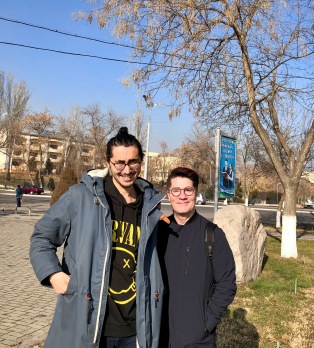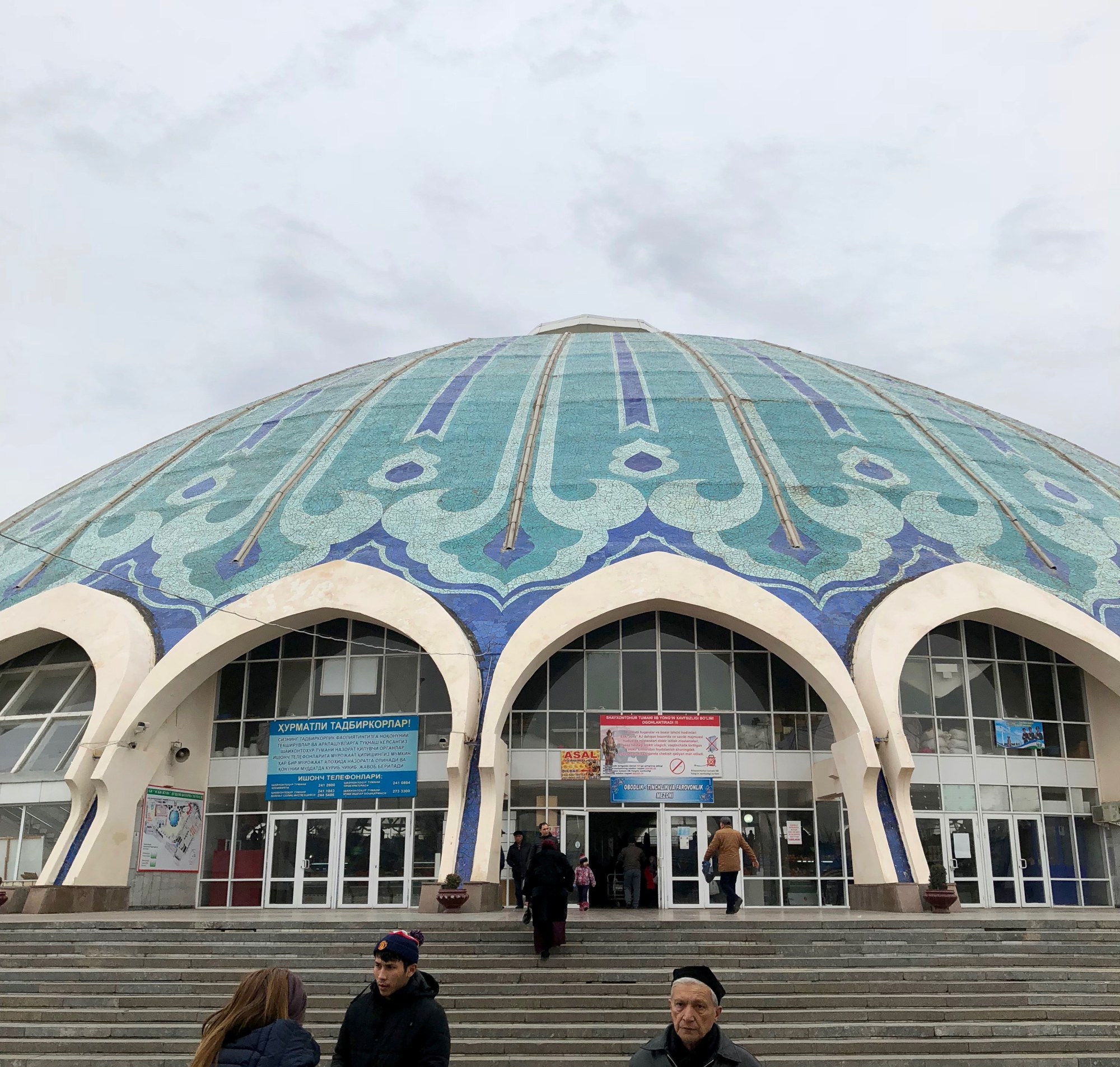Phil Johnson, Ph.D.
January 25, 2018
www.globalnext.org
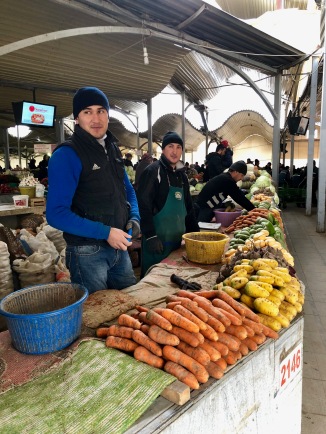 OK, admit it – you aren’t exactly sure where Uzbekistan is. It’s OK, you’re not alone. Collectively, we’ve pretty much ignored this part of the world with the notable exception of Afghanistan. But 2017 put Uzbekistan front and center with a spate of terror attacks all purportedly committed by Uzbeks. But why Uzbeks? Part of the answer might lie in the repressive and often violent conditions of a nation that is both post-Soviet and Muslim-majority.
OK, admit it – you aren’t exactly sure where Uzbekistan is. It’s OK, you’re not alone. Collectively, we’ve pretty much ignored this part of the world with the notable exception of Afghanistan. But 2017 put Uzbekistan front and center with a spate of terror attacks all purportedly committed by Uzbeks. But why Uzbeks? Part of the answer might lie in the repressive and often violent conditions of a nation that is both post-Soviet and Muslim-majority.
2017 began with a mass shooting at a night club in Turkey, killing 39 and wounding more than 70 others – the suspect was born in Uzbekistan and trained in Afghanistan) followed by the bombing of the St. Petersburg metro station in Russia (15 killed and 45 wounded – ethnic-born Uzbek with Russian citizenship.) And then the Stockholm truck attack by the Uzbek national, who had been refused Swedish residency (5 killed and 14 seriously injured).
Finally the event that put Uzbekistan on the US radar was the October 31st truck attack by Sayfullo Saipov, (beneficiary of the controversial “immigration lottery”). His attack killed 8 people and seriously wounded 20 others using a rented truck to mow down people on a bike path. His rampage ended by crashing into a school bus. There was ISIS material in his rented truck and he declared his actions and allegiance were on behalf of ISIS.
So, when the opportunity presented itself (Meaning: I applied for a visa and bought a plane ticket) I packed my bags and headed for this former Soviet Republic to see what was going on. I spent time with Timur Karpov, a journalist from Front Line Defenders, and a “source” that requested that I not name him nor the organization he works for (and yes, we met in a nondescript park, far from any listening devices and eavesdroppers – exactly as some of you would have hoped.) I even had a brief…very brief visit with, Mrs. Saipov, NYC terrorist, Sayfullo’s Siapov’s mother. Needless to say she wasn’t thrilled with my unannounced visit to her home and had clearly been instructed to say nothing. (By the way, Timur Karpov, who was with me, is credited with locating Sayfullo Sipov’s family’s home when the New York City incident broke.)
So what’s going on in Uzbekistan and why does it seem Uzbeks are recently linked to more than their fair share of terror events. Here are some of my take-aways from my time in Tashkent, Uzbekistan:
How to Survive in Uzbekistan: Keep Quiet!
It’s dangerous to be a journalist, dissident or devout Muslim in Uzbekistan. Islam 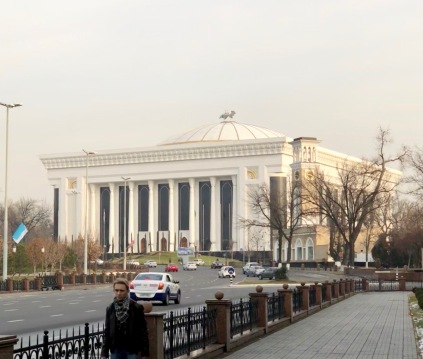 Karimov, the former president of Uzbekistan ruled the country since its Soviet Republic Days, from 1989 until his death in 2016. He was notorious for ruling the country with an iron fist, with no tolerance for dissent or perceived threats to his power base. Political variance, out-of-step opinions, radical religious ideas and basic free speech will get you branded as an enemy of the state. It is tantamount to asking for a prison sentence with a side of torture for good measure. The frequent use of torture by the Uzbek government was confirmed to me by a high level source who is well acquainted with human rights abuses in Uzbekistan – especially in the notorious Jaslyk Prison, know for its inhuman treatment of religious prisoners. And I’m talking boiling-people-alive-kind-of-torture. The repression and fear is so wide-spread, you can hardly get anyone to even discuss much less admit what is happening in the country.
Karimov, the former president of Uzbekistan ruled the country since its Soviet Republic Days, from 1989 until his death in 2016. He was notorious for ruling the country with an iron fist, with no tolerance for dissent or perceived threats to his power base. Political variance, out-of-step opinions, radical religious ideas and basic free speech will get you branded as an enemy of the state. It is tantamount to asking for a prison sentence with a side of torture for good measure. The frequent use of torture by the Uzbek government was confirmed to me by a high level source who is well acquainted with human rights abuses in Uzbekistan – especially in the notorious Jaslyk Prison, know for its inhuman treatment of religious prisoners. And I’m talking boiling-people-alive-kind-of-torture. The repression and fear is so wide-spread, you can hardly get anyone to even discuss much less admit what is happening in the country.
How to Suppress Islam in a Muslim-Majority Country.
Uzbekistan is a country of nearly 32 million people with 80% of its population identifying as Muslim. But it’s difficult to be very Islamic in Uzbekistan. Nearly impossible to be a Fundamentalist. During the regime of President Islam Karimov, Islamist political parties were outlawed and dozens of religious activists were imprisoned and tortured. According to The Atlantic, “All clerics are government vetted; all madrassas are 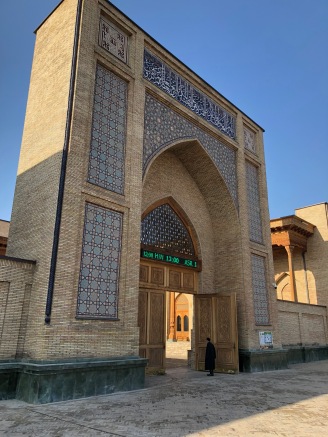 government controlled and infiltrated by undercover informants. Pilgrims to Mecca have to go through a rigorous government vetting process and are then accompanied on the journey by government minders. The communal marking of the end of each day of fasting during the month of Ramadan is banned, as is the celebration of Eid al Fitr, the feast marking the end of Ramadan. Until recently, children under 18 were banned from attending mosques.” Names were noted. Lists were kept and speaking to the wrong person could get your name on that list – or in prison. The Atlantic reports that until very recent changes from the new Uzbek President, that “list’ contained 18,000 names.
government controlled and infiltrated by undercover informants. Pilgrims to Mecca have to go through a rigorous government vetting process and are then accompanied on the journey by government minders. The communal marking of the end of each day of fasting during the month of Ramadan is banned, as is the celebration of Eid al Fitr, the feast marking the end of Ramadan. Until recently, children under 18 were banned from attending mosques.” Names were noted. Lists were kept and speaking to the wrong person could get your name on that list – or in prison. The Atlantic reports that until very recent changes from the new Uzbek President, that “list’ contained 18,000 names.
Supposedly the reason for all these restrictions was because of the IMU – the Islamic Movement of Uzbekistan – a jihadist organization that manifested itself just after the Soviet Union went belly-up. The IMU wanted to impose Islamic law in Uzbekistan and quickly became a threat to the rule of President Karimov.
But in Uzbekistan, you don’t even need to be on a list to be accused of terror activity. According to my contact, Timur Karpov, when the government needs a terrorist to “make a point” or “give a reminder” to the public, it simply creates one.
From his own research regarding forced false confessions, Timur Karpov reports, “I’ve talked to mothers and wives of four illegally imprisoned men from Navoi who have been accused of supporting radical religious movements. Relatives reported to human rights activists about their cases after several courts had rudely violated their rights. Inabad Arzieva reports that when her son was taken by the authorities, he was absolutely healthy, but by the time she saw him in the courthouse he appeared on crutches. Later, in a private talk with his mother, he told her that he had been tortured and his spine was broken. He was forced to sign papers admitting his guilt. Relatives sent appeals but there were no proper responses and the prison sentence stayed the same. In September of 2017, despondent and hopeless, Inabad Arzieva tried to commit suicide through the act of self immolation. Immediately after she poured gasoline on her self she was stoped by police.”
Timur Karpov’s work with these families shows the utter powerlessness that is often felt in the face of the Uzbek government where evidence of crimes, due process and human rights are not commodities enjoyed by those found on “lists.”
How to Increase Extremism Through Repression
Make no mistake about it – radical, political Islam is an ideology – a way of thinking, believing, living and following the commands of God – as you see it, from the sacred texts you trust. It has a world-wide domination element. When an idea is suppressed, imprisoned and tortured, it’s not likely to go away. And in Uzbekistan’s case, the repression of Islam has driven it underground, into neighboring countries and ultimately allowed it to reappear in deadly ways in other parts of the world. President Karimov and his extreme measures to tamp down Islamic extremism has not solved the problem of radicalism in and around Uzbekistan. The extremists have simply gone deep, gone to other places and ultimately brought death and destruction to other places.
How to Prep a Generation for Radicalization
First, it’s important to realize that the number of Uzbeks that have become radicalized enough to join ISIS ranges somewhere between 500 and 1500 people- depending on the source. That’s a tiny number of individuals compared to a population of more than 30 million. But on the other hand, it is a horrifyingly large number of people who want to join a group that wants to impose a draconian form of a religion and world-view on the planet.
Also important to realize is that most of the terror attacks associated with Uzbeks are not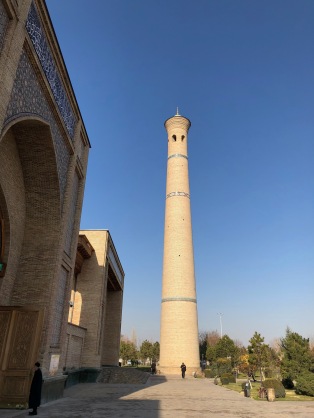 happening inside Uzbekistan. These “soldiers of the Caliphate” are being radicalized outside of Uzbekistan. There are many that go to Russia for work, and in that freer environment they are vulnerable to the ideas of ISIS and other radical groups. There are a number of ways an individual can be radicalized – through a personal relationship, social groups at the local mosque, through a charismatic imam of a mosque, through ISIS propaganda (which is produced in numerous languages and aggressively marketed) or by simply being influenced online by reading Islamist literature, watching propaganda videos and “how to” instructional videos.
happening inside Uzbekistan. These “soldiers of the Caliphate” are being radicalized outside of Uzbekistan. There are many that go to Russia for work, and in that freer environment they are vulnerable to the ideas of ISIS and other radical groups. There are a number of ways an individual can be radicalized – through a personal relationship, social groups at the local mosque, through a charismatic imam of a mosque, through ISIS propaganda (which is produced in numerous languages and aggressively marketed) or by simply being influenced online by reading Islamist literature, watching propaganda videos and “how to” instructional videos.
Once a person leaves a country that has controlled every aspect of what he thinks, what he believes and what he can say, it’s much easier to influence thoughts, values and beliefs. Especially if you are now being told that the most precious, eternal beliefs of all have been denied to you. And that your family has not been taking religion seriously. But now, you have your chance to follow something that matters and make your mark on the world.
And just because the Islamic State’s Caliphate is (for all practical purposes) gone, it doesn’t mean the ideology of radical Islam is gone with it. What it means is that new recruits and devotes to ISIS, the Taliban, Al-Qaeda and like-minded extremists will go elsewhere to live out their beliefs. The hornet’s nest has been smashed, but the hornets still have their wings and stingers.
So whether these expatriate Uzbeks have had their training in Afghanistan, Iraq, Syria, Turkey, Russia, or online – all of those places provide vastly more freedom of information and recruiting opportunities than Uzbekistan does. Open Democracy, for example, concluded that Central Asian migrants in general are more susceptible to the ideas of radical Islamic groups once away from their homelands. In a foreign society, without their families, they look for a way – a place to fit in. Some find that place inside the Muslim community in their new country. They learn new ways of thinking, discuss new ideas and adopt new concepts and attitudes about their Muslim faith. Total repression – such as occurs in Uzbekistan – does not allow for dialogue. It creates a viable market of young people who are easy to recruit once they taste even little bits of freedom in other countries where ideas – good and dangerous are easier to express.
The Hope for Change
In 2016, Shavkat Mirziyoyev became the new president of Uzbekistan, upon the death of long-term President Karimov. President Mirziyoyev has already begun to roll back some of the more repressive policies that were in place under the previous regime. On December 7th, 2700 prisoners were released (mostly political prisoners along with some forced-confession extremist prisoners). The President has also halted the practice of forced labor in Uzbekistan’s cotton fields, (forced child labor was phased out in 2015 under intense international pressure) and Mirziyoyev is introducing new economic and tax reforms. Relations with the neighboring countries of Tajikistan, Kyrgyzstan, and Afghanistan are beginning to improve dramatically as well and all of this brings some hope – hope that real and lasting change will occur. There is some optimism that freedom will increase and with that freedom, opportunity, openness and discussion will replace fear and repression. But time will tell how deep and how lasting the changes will be. Even with the new link between Islamic extremist and Uzbeks still fresh in the global consciousness, inside Uzbekistan, optimism is in the air. As one young Uzbek university English teacher told me, “You have to have optimism. You have to hope that things will get better. If we don’t have hope, we don’t have anything.”
*Special thanks to Timur Karpov for his help in making contacts and providing information for this article. Also many thanks for Brennan Graham for his work in providing pre-research information for this project.
